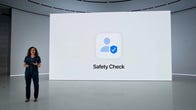This story is part of WWDC 2022, CNET’s complete coverage from and about Apple’s annual developers conference.
Apple on Monday announced a new Safety Check feature for iOS 16 aimed at people in abusive relationships. The feature lets users review and reset who has access to location information as well as passwords, messages and other apps on an iPhone.
Apple debuted the feature at its annual WWDC event. Phones can become stalking devices in abusive relationships, with features that can be convenient in some relationships giving abusers dangerous information. That’s especially true when people try to leave their abusers, a time that domestic violence experts say is the most dangerous point for survivors.
“Many people share passwords and access to their devices with a partner,” Katie Skinner, a privacy engineering manager at Apple, said at the event Monday. “However, in abusive relationships, this can threaten personal safety and make it harder for victims to get help.”
In addition to turning off location sharing, the Safety Check feature resets your privacy permissions on apps and protects access to your messages, limiting iMessage and FaceTime sessions to your device only. It also prompts you to reset your Apple ID password, which would revoke anyone else’s access to your iCloud account and any sensitive data stored there. It also lets you review your emergency contacts.
Domestic violence experts say survivors have to juggle many tech concerns as they look for a way out and finally leave an abusive relationship. Just looking at a website for domestic violence resources can put someone at risk if an abusive partner has access to web browsing history. On the other hand, cutting off access to personal data shared with an abuser can prompt that person to escalate intimidation or violence, so survivors need a safety plan in place when deciding whether or when to revoke access. Finally, location data can help abusers find victims after they leave.
Safety Check can remove access that you’ve intentionally granted to a partner or family member. Resetting the Apple ID password would also likely disable any tracking software an abusive partner has added without your knowledge. Known as stalkerware, tracking software is designed to intercept location information, messages and web searches, but it typically works on iPhones only if the abuser has the target’s iCloud password.
Read more: Stalkerware: What to Do if You’re the Target
Apple worked with domestic violence prevention agencies to develop the feature, including the National Network to End Domestic Violence, the Women’s Services Network and the National Center for Victims of Crime.
“In times of crisis, for many survivors, it’s important to know who has their location and information,” the National Center for Victims of Crime said in a statement shared by Apple. “Safety Check helps give control back to survivors.”
Apple has faced criticism over the impact its technology can have on domestic abuse survivors. The company’s AirTag product, for example, is a small, easy-to-hide location-tracking device that advocates point out could be used to stalk someone. Apple has responded to these complaints by making an app that lets Android users detect nearby AirTags (previously only iPhone users could do this) and also warning AirTag users that it’s illegal to stalk people and that Apple will give their personal information tying them to a specific AirTag to law enforcement if asked.
The company has also made changes to the warning sounds the devices emit to alert people that there’s an AirTag nearby, with the goal of making them more useful to people who might be targeted with an unwanted device.






